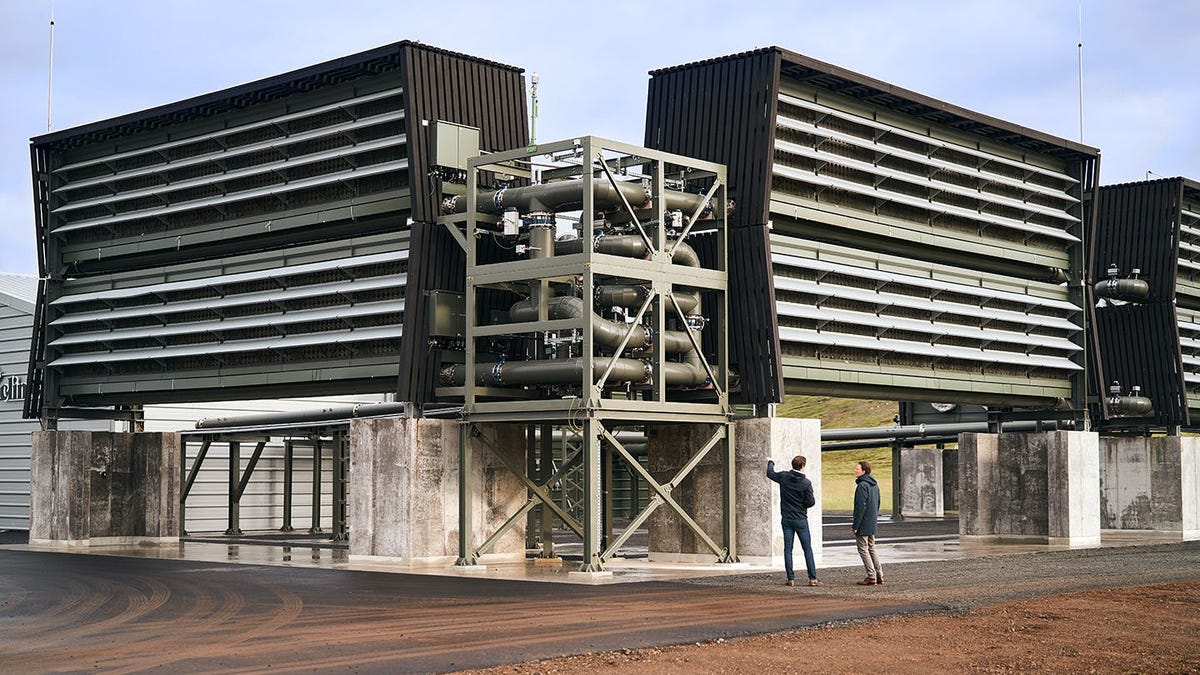Google, Facebook, Stripe Have a $925M Plan to Capture Carbon Pollution
A promise to spend big now is designed to boost confidence in a technology to fight climate change that still a lot to prove.

Climeworks' Orca captures carbon dioxide from the air.
The parent companies of Facebook and Google have joined a nearly $1 billion program designed to fight climate by committing to purchase carbon capture technology when it's developed.
Meta and Alphabet said on Tuesday they had joined Frontier, a subsidiary of payment processor Stripe that pledges spending will eventually flow to approved carbon capture projects. E-commerce company Shopify and consulting firm McKinsey have also joined the Frontier program.
Frontier is an example of an advance market commitment, a guarantee that developers of a technology will be able to sell it once it's been developed. The arrangement is used when the cost of developing a new product, such as a vaccine or drug, is so high that companies worry that doing so won't be profitable.
Frontier's members have pledged to spend a combined $925 million through 2030 on technologies that remove carbon dioxide, the primary gas causing global warming, from the atmosphere. Most efforts to combat climate change focus on reducing emissions in the first place, for example, by shifting to renewable energy and reducing meat consumption, but carbon capture could be important to compensate for carbon emissions from operations like steel and concrete production. Carbon capture will only help if it works economically at an enormous scale of gigatons per year.
Climate change is causing an increase in storms, droughts and wildfires, as well as plunging biodiversity, according to a February Intergovernmental Panel on Climate Change report.
So far, carbon capture technology has permanently removed less than 10,000 tons of carbon dioxide from the atmosphere, far short of the billions of tons per year the IPCC says is needed. Frontier hopes that by pledging to buy carbon capture technology, its members can encourage entrepreneurs to develop the systems needed.
"With Frontier, we want to send a loud demand signal to entrepreneurs, researchers and investors that there is a market for permanent carbon removal: build and we will buy," Nan Ransohoff, head of Stripe's climate work, said in a statement.
Tech giants already have sought to reduce their carbon footprint by purchasing renewable energy and other efforts. In March, Microsoft called for more businesses to enter the carbon capture market.
And on Wednesday, Intel pledged to reduce its greenhouse gas emissions to zero by 2040. That effort will require energy conservation measures for its facilities, more use of renewable energy, and the research and adoption of new chipmaking technologies that don't produce a collection of highly potent greenhouse gases.
Carbon capture, backed by startups like like Climeworks and CarbonCapture, has a lot to prove technologically and financially. For now, costs range from $600 to $1,000 to remove a ton of carbon dioxide from the air through direct air capture, a price that could drop to between $100 and $300 as companies gain experience, according to the IPCC.
But there are other ways to capture and store carbon. Charm Industrial, for example, is working on technology to convert plant waste like corn stalks into a form of carbon that can be pumped into underground caverns left over from methane production for long term storage. That means it doesn't decompose and release greenhouse gases.
Charm's current costs are $600 per ton, but if it gets $100 million worth of contracts, it can bring the price down to about $250 per ton, and it hopes to lower costs further, Chief Executive Peter Reinhardt said.

